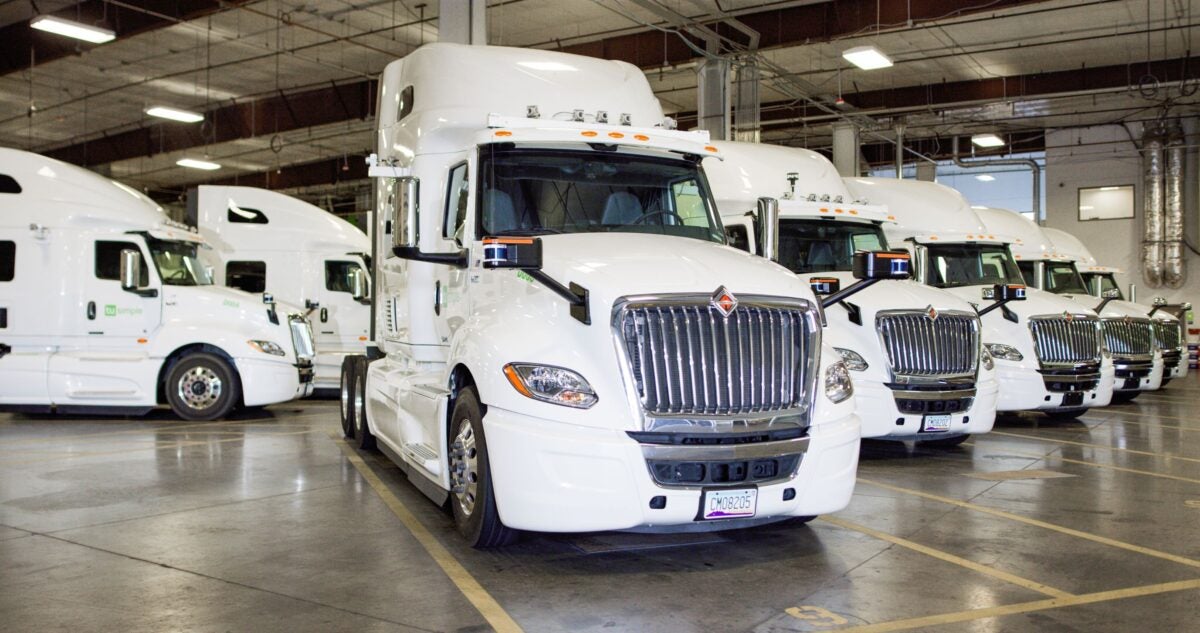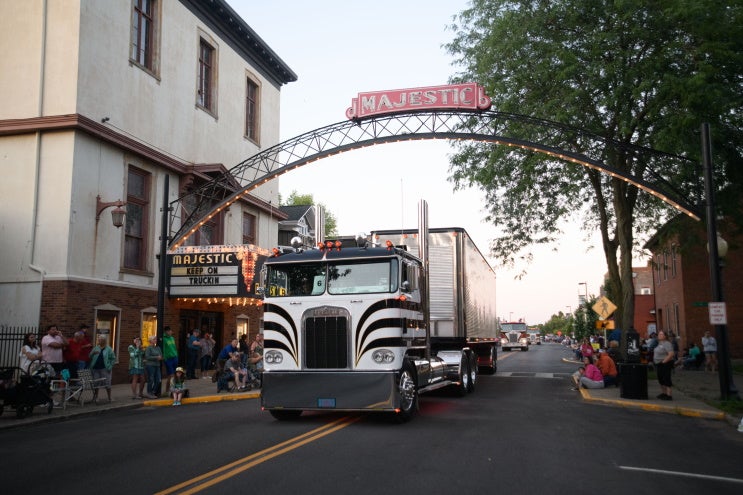The ongoing shake-up at TuSimple suggests a co-founder’s impatience. Hyliion Holdings is already benefiting from support by an outsized rival. Plus, a war of press releases over reducing emissions and a plea for autonomous truck testing in California.
TuSimple intrigue
The shake-up at TuSimple that began in March has developed into a full-on house cleaning. Most notable is the departure of Pat Dillion. His Wall Street background brought investor relations credibility to the autonomous trucking startup.
Xiodai Hou co-founded the company. Now he effectively is the company. A compelling story in The Information that posted Thursday recounts a tense meeting in January. Hou questioned why TuSimple’s stock price did not reflect it being the first to remove the driver from an autonomous truck. The milestone occurred in late December.
After opening up 10% in premarket trading on the news, the share price resumed a fall from $37 in January. TuSimple traded at $7.42 intraday Friday, mirroring disdain for most publicly traded transportation startups.
In a clumsily executed transition, Hou succeeded Cheng Lu as CEO in March. Around the same time, the Committee on Foreign Investment in the United States (CFIUS) concluded an investigation into TuSimple. CFIUS set up monitoring to assure intellectual property was not being shared with TuSimple’s China operations.
TuSimple management exodus
With a doctorate in computation and neural systems from the California Institute of Technology, Hou is the smartest guy in the room at TuSimple. Practically none of the management team in place when the company went public via initial public offering in April 2021 is around to challenge him.
In addition to Lu and Dillon, co-founder and Chairman Mo Chen is gone. So is Chuck Price, the chief product officer, who departed in December. Price and Lu remain advisers, but neither sits at the table where decisions are made.
Jason Wallace, TuSimple’s head of marketing, and Mission Control Communications, the TuSimple media relations firm, followed Mo Chen. They now work for his hydrogen-based autonomous startup called Hydron.
Jim Mullen, a former acting director of the Federal Motor Carrier Safety Administration, remains TuSimple Chief Administrative and Legal Officer, according to his LinkedIn profile.
Firmly in charge
Despite the widespread shake-up, TuSimple remains on track to commercial viability. Relationships and partnerships formed before Hou swept up the CEO and chairman’s roles remain in place.
Manufacturing partner Navistar is still on board. It is a year behind the 2024 target to have a ground-up autonomous truck ready for TuSimple software. TuSimple continues to haul freight autonomously with safety drivers for United Parcel Service.
Retrofitted Navistar autonomous trucks still haul freight, generating revenue in the single-digit millions. TuSimple had about $1.2 billion in cash and equivalents at the end of the first quarter.
Hou is firmly in charge, much like Tesla’s Elon Musk, who makes all the decisions at the electric car company. Hou’s personality dictates his need to be in control, observers said..
Hou’s moves may have cost TuSimple credibility with investors, even if the company retains a first-mover technology advantage.

Hyliion’s momentum
Hyliion’s announcement this week that it would work with Cummins Inc. to certify the 12-liter natural gas engine it is already using in prototypes of its Hypertruck ERX brought almost immediate benefits to the startup.
The day after Hyliion said Cummins — a threat to Hyliion’s viability — would become a partner, NFI Industries put down deposits on 10 Hyliion Hypertruck ERX models. NFI receives most of its attention for greening its drayage fleet, which will be all electric by mid-2023.
Moving from being on Hyliion’s Hypertruck Innovation Council to customer-in-waiting is further evidence that Hyliion might emerge a winner among alternative fuel transportation startups.
“By investing in green technology like the Hypertruck ERX, we’re able to take another transformative step toward a zero-emissions freight industry,” Jim O’Leary, NFI vice president of assets, said in a news release. “I look forward to seeing the impact these Hypertruck ERX units will have in further reducing our carbon footprint.”
Having Cummins as a collaborator, rather than a rival, is a game changer, Hyliion CEO Thomas Healy said this week
“Cummins is a large, large player in this space and has a tremendous amount of credibility and confidence from fleets,” Healy said. “So, all across the board, this helps Hyliion, whether it be with the OEM or fleet discussions we’re having.”
One thing that hasn’t changed for the better is Hyliion’s share price. It is down about 21% over the last week, closing at $3.22 Thursday.
War of words
“Sticks and stones may break my bones but words will never hurt me.” The African Methodist Episcopal Church gets credit for the old adage dating to 1862.
We’ll see how well it holds up.
Environmental groups are seeking to shame the Truck and Engine Manufacturers Association and its members. The EMA in May sued the California Air Resources Board to delay a 2024 regulation requiring dramatically lower nitrogen oxide (NOx) emissions from heavy-duty trucks.
The EMA alleges CARB’s low NOx emission standards ignore the required minimum four years to allow manufacturers to prepare.
Uniting as Electric Trucks Now, 21 organizations, including the Environmental Defense Fund and the Natural Resources Defense Council, are calling out EMA members siding with the trade group’s action and praising those opposing it. Daimler Truck North America, Volvo Trucks North America and Cummins Inc. are accused of paying “lip service” to cleaner air.
The tactic is similar to the EMA’s use of quotes from companies and organizations about CARB’s near-immediate implementation of its Omnibus truck rule being an overreach. The EMA is also throwing shade on the Environmental Protection Agency over its cost increase estimates under its NOx emissions-reducing Clean Trucks Plan.
About those autonomous regulations
Speaking of letters, a group of 35 industry leaders wrote to California Gov. Gavin Newsom urging him to start moving on legalizing autonomous truck testing in his state.
California has allowed testing of light-duty autonomous vehicles weighing less than 10,001 pounds since 2019. But heavy-duty trucks with high-autonomy software are prohibited from road testing. Most major developers of autonomous trucks are either based or have a presence in California.
The letter says California is falling behind other states with more permissive rules regarding the types of AVs that can operate on public roads. A lot of autonomous truck testing is based in Texas, Arizona and New Mexico.
“In effect, it has been 10 years since the initial 2012 enabling legislation, and over this period, there has been no movement for autonomous trucking regulation,” the letter said.
No timetable for autonomous heavy-duty truck testing has been established, according to the California Department of Motor Vehicles.
Briefly noted
- Medium-duty box trucks could be 100% electrified, according to the most recent finding from the North American Council for Freight Efficiency. Some will be easier than others, but they can all get there, according to the NACFE report.
- The Kenworth Class 8 truck assembly plant in Chillicothe, Ohio, recently hosted the first Kenworth truck parade with more than 50 new, classic and customized trucks from 28 states and Canada participating.

That’s it for this week. Thanks for reading. Click here to get Truck Talk in your email on Fridays.
Alan







